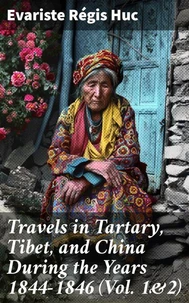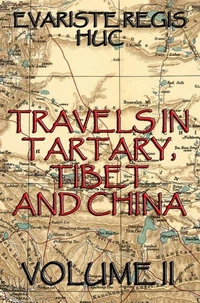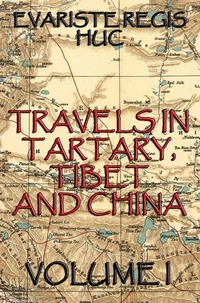Travels in Tartary, Tibet, and China During the Years 1844 - 1846 (Vol. 1&2)
Par : ,Formats :
Disponible dans votre compte client Decitre ou Furet du Nord dès validation de votre commande. Le format ePub est :
- Compatible avec une lecture sur My Vivlio (smartphone, tablette, ordinateur)
- Compatible avec une lecture sur liseuses Vivlio
- Pour les liseuses autres que Vivlio, vous devez utiliser le logiciel Adobe Digital Edition. Non compatible avec la lecture sur les liseuses Kindle, Remarkable et Sony
 , qui est-ce ?
, qui est-ce ?Notre partenaire de plateforme de lecture numérique où vous retrouverez l'ensemble de vos ebooks gratuitement
Pour en savoir plus sur nos ebooks, consultez notre aide en ligne ici
- Nombre de pages580
- FormatePub
- ISBN859-65--4773444-4
- EAN8596547734444
- Date de parution27/11/2023
- Protection num.Digital Watermarking
- Taille3 Mo
- Infos supplémentairesepub
- ÉditeurDIGICAT
Résumé
In "Travels in Tartary, Tibet, and China During the Years 1844-1846, " Evariste Régis Huc presents an intricate narrative that transcends mere travelogue, embodying elements of adventure, ethnography, and cultural analysis. Spanning two volumes, Huc's work offers an invaluable glimpse into the societies and landscapes of Central Asia and Tibet, skillfully weaving vivid descriptions with insightful commentary on local customs, religions, and the geopolitical climate of 19th-century Asia.
His poetic prose reflects Romantic ideals, while the detailed observations position the text within the broader context of Western exploration during this era, offering a bridge between East and West amid rising colonial interest. Huc, a French missionary and explorer, was profoundly influenced by his experiences in the Far East, which ignited his curiosity and respect for its diverse cultures. Imbued with a keen sense of observation and a desire to foster understanding across cultures, Huc's travels were not merely geographical but also spiritual and philosophical.
His background in the Catholic Church played a significant role in his reflections on the societal and religious dimensions of the regions he traversed. This work is highly recommended for those interested in the intersections of travel, culture, and religion. Huc's travels illuminate the richness of Eastern traditions and offer a nuanced perspective that encourages modern readers to appreciate the complexities of these societies, making it a compelling read for historians, travelers, and cultural enthusiasts alike.
His poetic prose reflects Romantic ideals, while the detailed observations position the text within the broader context of Western exploration during this era, offering a bridge between East and West amid rising colonial interest. Huc, a French missionary and explorer, was profoundly influenced by his experiences in the Far East, which ignited his curiosity and respect for its diverse cultures. Imbued with a keen sense of observation and a desire to foster understanding across cultures, Huc's travels were not merely geographical but also spiritual and philosophical.
His background in the Catholic Church played a significant role in his reflections on the societal and religious dimensions of the regions he traversed. This work is highly recommended for those interested in the intersections of travel, culture, and religion. Huc's travels illuminate the richness of Eastern traditions and offer a nuanced perspective that encourages modern readers to appreciate the complexities of these societies, making it a compelling read for historians, travelers, and cultural enthusiasts alike.
In "Travels in Tartary, Tibet, and China During the Years 1844-1846, " Evariste Régis Huc presents an intricate narrative that transcends mere travelogue, embodying elements of adventure, ethnography, and cultural analysis. Spanning two volumes, Huc's work offers an invaluable glimpse into the societies and landscapes of Central Asia and Tibet, skillfully weaving vivid descriptions with insightful commentary on local customs, religions, and the geopolitical climate of 19th-century Asia.
His poetic prose reflects Romantic ideals, while the detailed observations position the text within the broader context of Western exploration during this era, offering a bridge between East and West amid rising colonial interest. Huc, a French missionary and explorer, was profoundly influenced by his experiences in the Far East, which ignited his curiosity and respect for its diverse cultures. Imbued with a keen sense of observation and a desire to foster understanding across cultures, Huc's travels were not merely geographical but also spiritual and philosophical.
His background in the Catholic Church played a significant role in his reflections on the societal and religious dimensions of the regions he traversed. This work is highly recommended for those interested in the intersections of travel, culture, and religion. Huc's travels illuminate the richness of Eastern traditions and offer a nuanced perspective that encourages modern readers to appreciate the complexities of these societies, making it a compelling read for historians, travelers, and cultural enthusiasts alike.
His poetic prose reflects Romantic ideals, while the detailed observations position the text within the broader context of Western exploration during this era, offering a bridge between East and West amid rising colonial interest. Huc, a French missionary and explorer, was profoundly influenced by his experiences in the Far East, which ignited his curiosity and respect for its diverse cultures. Imbued with a keen sense of observation and a desire to foster understanding across cultures, Huc's travels were not merely geographical but also spiritual and philosophical.
His background in the Catholic Church played a significant role in his reflections on the societal and religious dimensions of the regions he traversed. This work is highly recommended for those interested in the intersections of travel, culture, and religion. Huc's travels illuminate the richness of Eastern traditions and offer a nuanced perspective that encourages modern readers to appreciate the complexities of these societies, making it a compelling read for historians, travelers, and cultural enthusiasts alike.





